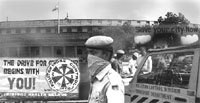False start
 the mandarins may just as well go on discussing air pollution control strategies forever without any effect on urban air quality. The basic flaw with the nebulous air quality planning exercise in India is that the regulators neither have a sense of urgency nor a clear, sharp focus to develop a proactive agenda and push for hard decisions.
the mandarins may just as well go on discussing air pollution control strategies forever without any effect on urban air quality. The basic flaw with the nebulous air quality planning exercise in India is that the regulators neither have a sense of urgency nor a clear, sharp focus to develop a proactive agenda and push for hard decisions.
Though consultations at the government level to frame action strategies to cut emissions is becoming increasingly popular, interest in dealing with the problem in a comprehensive manner is lacking. When polluters and the regulators attempt to frame an action plan, swords are drawn immediately to stave off pressures to commit to anything substantive. It is a war to guard interests rather than address the serious issue of poor air quality and the immediate risks to public health.
This was starkly evident in the recent workshop on an integrated approach to vehicular pollution control in Delhi, organised by the World Bank ( wb ) and the Delhi government. The objectives were to develop a consensus action plan to cut emissions by half in Delhi by 2005, improve upon the strategy framed earlier by the Delhi government, and to help identify projects that the wb can fund.
The resultant action plan focused on air quality standards, regulation and impact analysis, traffic management systems, and fuel and vehicle technology, among other things. But the priority list of action that was that was drawn up had no rationale to convince how would it will help halve emissions by 2005. For the best part, it only included more pilot projects and studies.
The workshop did not proceeded much beyond the original action plan of the Delhi government. The Centre for Science and Environment's ( cse 's) assessment of the original action plan of the Delhi government and the White Paper on Delhi's pollution by the ministry of environment and forests ( mef ) has shown that these strategies cannot arrest the plummeting air quality in the city. This becomes particularly alarming in view of the Central Pollution Control Board's ( cpcb 's) pointing out that vehicles will contribute 72 per cent of the pollution load in Delhi by the year 2000.
cse has repeatedly emphasised on the short-term but high-impact strategies to arrest this trend. On the top of the agenda should be a drastic improvement in the quality of fuel
Related Content
- Report on M/s Platinum AAC Blocks, Kherdi, Dadra & Nagar Haveli, 24/07/2020
- Zambia: 2019 in-depth vulnerability and needs assessment
- South Gujarat tribal activist Jayram Gamit,picked up, detained" under PASA, taken to Rajkot, ahead of planned protest- Appeal to release the Activist
- Captive democracy: abuse of the criminal system and filing false cases to curb dissent against the POSCO steel plant in Orissa
- 'False cases against those protesting illegal mining'
- Delhi slaps blanket ban on plastic bags: New Rules To Be Implemented Within A Year
